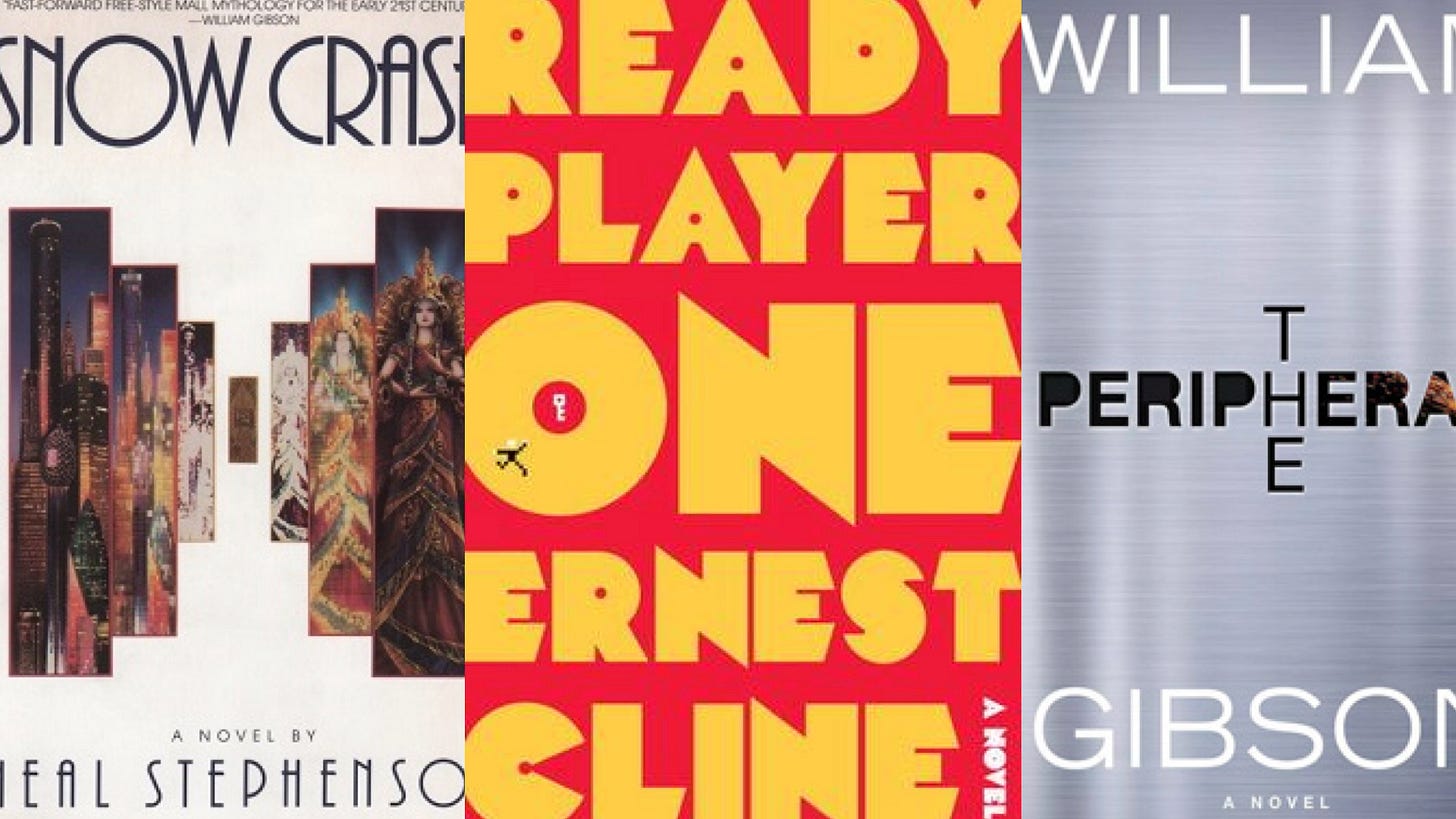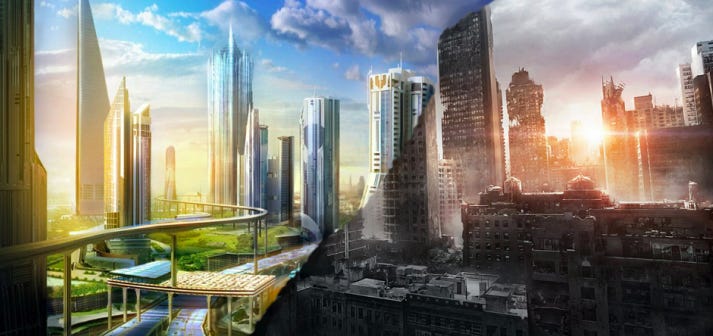Building an Anti-Dystopian Metaverse
We are so enamored by science fiction that we sometimes forget many of these popular stories present a dystopian vision of the future.
We are so enamored by science fiction that we sometimes forget many of these popular stories present a dystopian vision of the future.
While recording a conversation last week for Into The Metaverse podcast show with Louis Rosenberg (to be published in the coming weeks), Louis described some of the dangers for what could go wrong once the metaverse is realized and how technology companies can take advantage of a scaled, immersive virtual realm to harvest our personal data with depth and at a magnitude unachievable and unimaginable before (he wrote about it here as well). As Louis was laying out his arguments and examples, I visualized some of them in real-time as we were talking. As a cinema fan and and an avid reader, different books and movies started to come to mind with a common theme - a description of a future that is quite dystopian.
Why does it need to be dystopian?
Stories such as Ready Player One, Snow Crash, The Peripheral, Westworld and many more, captivate our imagination for what could be built with technology in the future and how this future impacts our way of life and our society. Naturally the authors and creators of these stories have a narrative that they conceived with the goal of creating a story that is interesting, that will resonate with an audience, that makes a book or a movie successful, and something that they are passionate about bringing to life. As such, they are wonderful stories. However, while I do not believe that “prediction” is the key pillar for their storytelling endeavor, it is nonetheless embedded in them in a way that informs, educates and entertain. What fascinates me is how these somewhat dystopian descriptions of the future end up being a source of inspiration for inventors and entrepreneurs who seek to bring the described technologies (some of which do not exist yet) into mainstream consumer use and shape an actual future.
Why do we get excited about building a future that is inspired by stories that portray a dystopian narrative?
Case in point - Ready Player One is a 2011 science fiction novel, and the debut novel of American author Ernest Cline. As described in Wikipedia, the story, set in 2045, follows Wade Watts on his search for an Easter egg inside a game-world accessible solely through virtual reality devices. The setting of the story is set in the 2040s when the world has been hit by an energy crisis from the depletion of fossil fuels and the consequences of pollution, global warming and overpopulation, causing widespread social problems, poverty, and economic stagnation. To escape this reality, people turn to the Oasis, a virtual reality simulator accessible using haptic technology such as gloves. In a way, the Oasis functions both as a multiplayer role-playing game and as a virtual world, with its own economy. The book became a huge success upon its publishing which also led to a successful cinematic experience with Ready Player One the movie (by Steven Spielberg). In the aftermath of the publication, and not necessarily related, we saw inventions such as Oculus coming to life, crowdfunded on Kickstarter in 2012 and later acquired by Facebook (now Meta Platforms) for $2 billion in 2014 (in what is now Reality Labs). I recall reading an article on Business Insider in 2016 titled: “Facebook gives its Oculus employees a dystopian sci-fi book to get them excited about building the future”. Assuming this story is not entirely incorrect, the striking dissonance in my mind is why would people get excited about building a future that is inspired by a book which portrays a dystopian reality?
The situation is not much different when we explore the stories of some of the other books and movies mentioned above. To be honest, I myself have used Snow Crash as an inspiration when thinking about the metaverse and what type of experiences and virtual worlds we’d like to build at Supersocial. We even gifted the book to new team members who join us with the intention that the book will somewhat serve as inspiration for what we should aspire to create and the future we should help shape. The truth is, I don’t want to help create that future. I want to help create a future that inspires and empowers people to socialize, explore, play, learn, work and be entertained in meaningful ways - a world that merges the physical and digital with economies that serve everyone with opportunities to create - products, businesses and wealth. A world that doesn’t strive to “fix” reality but one that strives to “shape” reality. A world that proactively enables a future we want to be part of and proud of, not a world that we reactively seek and redesign. It’s up to us - creators and entrepreneurs, to build the world we want to see.
Facebook, changing its corporate name to Meta Platforms in October 2021 turned the “light” on the metaverse as a concept, a market category, and a vision for the future of the Internet. Regardless of what will happen from here on, Facebook and Mark Zuckerberg turned the “metaverse” from a futuristic concept (that Neil Stephenson wrote about in Snow Crash) or an exploratory category (that folks like Matthew Ball wrote about in their blog or even myself as I aimed at explaining in Supersocial’s seed investor deck back in early 2020 the potential of the metaverse) into a relatively widespread business term - one that’s been used nearly 400 times during quarterly earnings of publicly traded companies in Q1 of 2022 and by millions more in business, art, entertainment and technology circles. While we remain in the very early stages of evolving the Internet into a Metaverse, many can see the giant wave and the surfers are abound. The key question now is what vision of the metaverse we want to create, and what inspiration will creators and entrepreneurs embrace as they shape the future of the Internet and how it all impact our lives. The future of humanity on Earth is by no mean controlled by what the metaverse will become, and it’s also true that what the metaverse shapes up to be is a consequence of not only entrepreneurial and creative endeavor but also, and perhaps more importantly, a reflection of our life IRL and the way it will impact what metaverse we end up creating. The metaverse won’t simply be a different, more immersive Internet but rather one that is powered by the symbiotic relationship of the “real” and the “unreal”.
A More Perfect Metaverse
With much of our inspiration for what a “metaverse” could become being drawn from books and movies that are quite dystopian, we need a paradigm shift for where inspiration comes from and which stories we build on as a reference for the future we’d like to see being created. What are the stories and who are the theorists that creators and entrepreneurs should take inspiration from as we work tirelessly to shape a future we can all believe in and get excited about for ourselves and for those who will succeed us. I would like to see, watch and read more stories, theories and concepts that inspire me and give me a greater sense of orientation for what we should aspire to create, as individuals and as a collective. Building a more perfect metaverse, one that works for everyone, is one of our greatest challenges in the coming decades. While the challenge may not be existential to life on Earth as climate change, I nonetheless believe that what the metaverse shapes up to become will have a fundamental impact on our global society, the way we live, the way we govern ourselves - alas, on who we are. The metaverse may currently be a nascent concept of what the Internet could become but the actions we take every day, as creators and entrepreneurs, and more broadly as a society, will be the ones that shape what the metaverse will actually look like in the years to come.
Doing so with the right framework of inspiration is something we should all aspire to and be committed for. Our children are counting on us.
Thank you for reading this letter.
If you liked it:
And:
Plus:
Connect and send me a message on Linkedin with suggestions for guests you’d like to see on the podcast show and topics you’d like to see covered.
Our mission is to become the leading destination to learn about the metaverse - what it is, why it’s important, how it will impact our lives, and what opportunities it unlocks. We are pursuing this mission by producing and publishing insightful and entertaining podcast shows and letters that help make sense of the metaverse.
Into The Metaverse covers companies, technologies and trends that are bringing this promise to life. Yonatan Raz-Fridman “Yon” (founder & CEO of Supersocial) interviews the brilliant minds building for, and investing in, the Metaverse.









